“Evolution”
Written by Michael Wagner & Michael Piller
Directed by Winrich Kolbe
Season 3, Episode 1
Production episode 40273-150
Original air date: September 25, 1989
Stardate: 43125.8
Captain’s Log: The Enterprise is observing a binary star system. A neutron star draws matter from a red giant, and every 196 years, there is an explosion of stellar matter. Dr. Kevin Stubbs, a renowned civilian scientist, is on board. For the past twenty years, he has been constructing a large-scale probe he calls “the egg,” which has been designed to examine this explosion, specifically study the decay of neutronium expelled at relativistic speeds from the massive stellar explosion.
However, just as they’re about to launch the egg, the ship starts going all binky-bonkers: inertial dampeners fail, shields won’t raise, engines won’t respond. They manage to use manual override to start the engines and shields—but it’s the first of dozens of malfunctions, which endanger the ship’s ability to function. At one point, the tactical console reads a Borg ship on approach.
Wes is concerned that his genetics homework—which involved two medical nanites working in tandem, and which got loose when he fell asleep while pulling an all-nighter—is responsible for the malfunctions, especially when La Forge finds lesions in the computer core. With his mother’s help, he soon learns that his fears are justified—the nanites are self-replicating, and the two have evolved into a civilization.
La Forge, Data, and Wes try to find ways to remove the nanites safely, but Stubbs sees his life’s work slipping away—if they miss their window, there won’t be another for two centuries, after all—so he wipes out an entire section of nanites with a gamma-ray burst.
The nanites turn nasty after that, going after the ship’s life-support system, and later going after Stubbs directly.
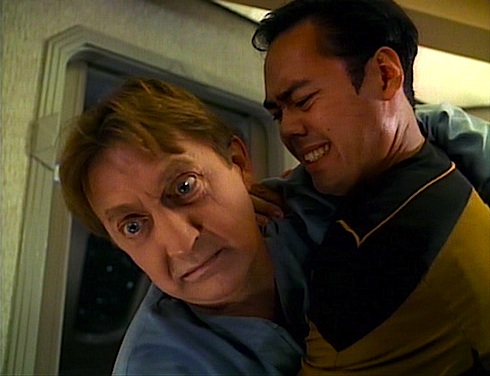
Data figures out a way to communicate with them, and allows the nanites to enter his own structure to serve as a conduit. The nanites have become sentient explorers. Stubbs apologizes for his actions, placing himself at the nanites’ mercy. The nanites accept the apology and say that the ship is too confining. Stubbs pulls some strings to find them a planet, the nanites put the computer back together so Stubbs can conduct his experiment, and everybody lives happily ever after.
Can’t We Just Reverse the Polarity?: The nanites are supposed to work independently. Wes’s experiment is for them to work in tandem, and it leads to their reproducing and improving their capabilities, eventually becoming sentient. Heckuva leap, that. But apparently they’re allergic to gamma rays.
Also, Data says there hasn’t been a catastrophic failure of a starship computer on this scale in seventy-nine years, conveniently forgetting the one that happened on his own ship in “Contagion” the previous year.
Thank You, Counselor Obvious: At one point, Stubbs pointedly asks Troi to “turn off your beam into my soul.” Not that it helps—Troi confirms that his entire self-worth is tied up in this experiment.
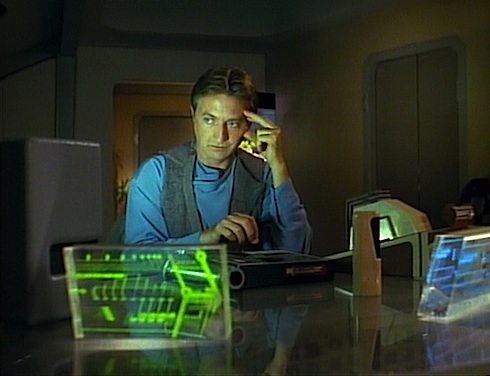
There is No Honor in Being Pummeled: Worf, on several occasions, finds himself agreeing with Stubbs, though coming from him it makes more sense and sounds less smarmy, since he’s concerned with the safety of the entire ship and its crew, not just his own experiment….
If I Only Had a Brain : Data volunteers to let the nanites invade his body, which Worf rightly points out is a huge risk, but Data insists that it would be a useful gesture toward peace.
No Sex, Please, We’re Starfleet: Picard and Crusher pick up right where they left off. They only have one scene together, but the chemistry between them remains powerful even after a year.
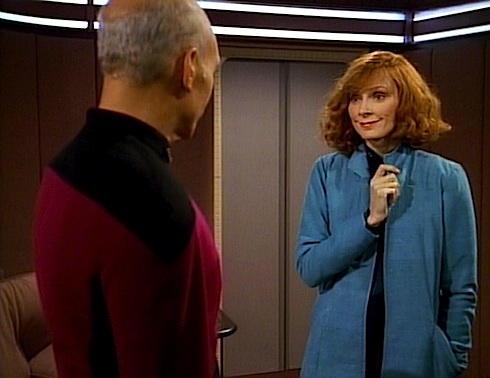
The Boy!?: Wes is reunited with his mother for the first time in a year, and things are awkward between them—more so when Wes snaps at Crusher that she hasn’t been there. Of course, that was just the guilt talking: in fact, Wes is responsible for the damage to the ship, an amusing reversal of his oft-cited role as the ship’s savior.
Syntheholics Anonymous: Guinan unusbtly likens Wes’s nanite experiment to that of the title character in Mary Shelley’s novel Frankenstein. She also talks with Crusher about Wes.
Welcome Aboard: Ken Jenkins is suitably snotty as Stubbs, though he doesn’t quite pull it off. The script calls for someone with what Troi refers to as a studied self-portrait, but Jenkins tries a bit too hard.
I Believe I Said That: “See? Now that is healthy for a boy his age—I mean that as a doctor, not as just a mother. It is so good to see him having fun for a change, with an attractive young woman who obviously looks at him with extraordinary affection. [pause] What do you know about this girl?”
Crusher going from enthusiastic doctor to worried mother over the course of a few sentences.
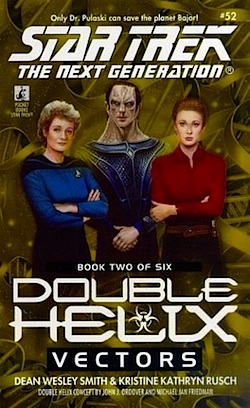 Trivial Matters: Without any kind of fanfare, Worf is promoted to full lieutenant, La Forge is promoted to lieutenant commander, and Pulaski has transferred off. With a bit more fanfare, Crusher returns after a year at Starfleet Medical.
Trivial Matters: Without any kind of fanfare, Worf is promoted to full lieutenant, La Forge is promoted to lieutenant commander, and Pulaski has transferred off. With a bit more fanfare, Crusher returns after a year at Starfleet Medical.
Some of what Crusher did during her year away was mentioned in the TNG novels Reunion by Michael Jan Friedman and A Time to Sow by Dayton Ward & Kevin Dilmore, as well as the Starfleet Corps of Engineers eBook Oaths by Glenn Hauman. Her last act as head of Starfleet Medical was to send Pulaski to Bajor on a mission that was shown in the novel Double Helix: Vectors by Dean Wesley Smith & Kristine Kathryn Rusch.
While Pulaski will never be seen again onscreen, she also shows up in the TNG novel Vendetta by Peter David, the S.C.E. eBook Progress by Terri Osborne, Marvel’s Deep Space Nine #3 comic book by Mariano Nicieza, and finally your humble rewatcher’s TNG novel A Time for War, a Time for Peace.
This episode sees the debut of the high-necked, looser uniform jackets, replacing the one-piece spandex uniforms—though extras and those without speaking parts still are stuck with the spandex until the fourth season. In an appearance on The Arsenio Hall Show shortly before this episode aired, Patrick Stewart said succinctly, “The new uniforms don’t hurt.”
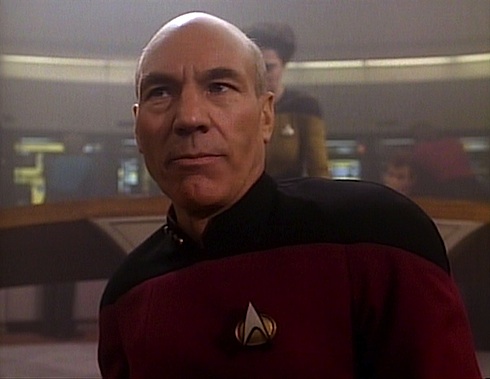
Maurice Hurley departed after the end of the second season as co-executive producer and head of the writers room. Initially, he was replaced by Michael Wagner, but he didn’t last long. On the strength of his draft of this episode, as well as Wagner’s recommendation, Michael Piller was hired for the job. Piller and Wagner worked together on the short-lived but excellent science fiction series Probe.
One touch of Piller’s is Stubbs’s love of baseball, something Piller would later inject into the Benjamin Sisko character on Deep Space Nine. During the episode, Stubbs mentally re-creates the final inning of the third and final game of the 1951 tie-breaker series between the Brooklyn Dodgers and the New York Giants, which ended with Bobby Thomson’s “shot heard ’round the world,” a home run that completed the Giants’ tremendous comeback from being thirteen-and-a-half games out in early August. However, the nanites attack Stubbs before Thomson can hit his homer in Stubbs’s head.
Stubbs makes reference to an unauthorized biography of him, a rare peek into life outside Starfleet on Star Trek.
Make it So: “The egg that Stubbs laid.” There’s nothing actively wrong with this episode, but nothing really stands out about it, either. It’s nice to see Wes endangering the ship instead of saving it for a change—it’s Data who really saves the day here—and it’s very nice to see Crusher back in the doctor seat. The episode also looks great, as Kolbe does an excellent job using the malfunctioning ship to create atmosphere and extreme closeups to good effect (starting with the opening shot of Wes asleep in the medical lab). And it’s hard to complain too terribly much about an episode that references both Frankenstein and Gulliver’s Travels.
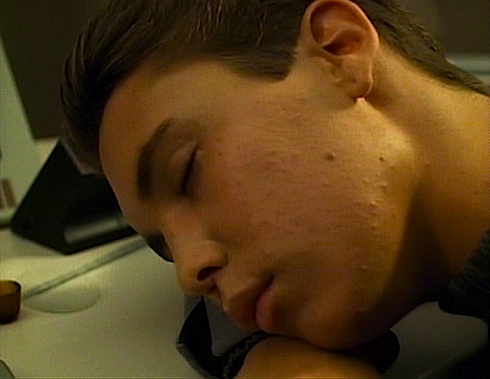
But the episode feels like it’s unfinished. Wes creates an entire species, and it’s fobbed off in a log entry at the end. For that matter, Wes creates an entire species that almost eats the ship alive, and there are absolutely no consequences to him.
It’s good to see deserved promotions to Worf and La Forge, it’s very good to see Crusher back—for starters, Gates McFadden and Wil Wheaton continue to have superb chemistry—and it’s extremely good to see the crew no longer wearing the unitards, but the episode itself is kinda nowhere.
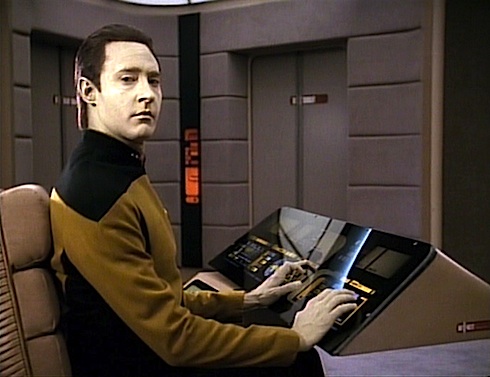
Warp factor rating: 5
Keith R.A. DeCandido has a story coming out in November called “Ragnarok and Roll” that will be in Tales from the House Band, edited by Deborah Grabien. His most recent critically acclaimed novels are Guilt in Innocence, part of “Tales from the Scattered Earth,” a shared-world science fiction concept, and the fantastical police procedurals SCPD: The Case of the Claw and Unicorn Precinct. Find out more about Keith at his web site, which is a portal to (among many other things) his Facebook page, his Twitter feed, his blog, and his podcasts, Dead Kitchen Radio, The Chronic Rift, and the Parsec Award-winning HG World.










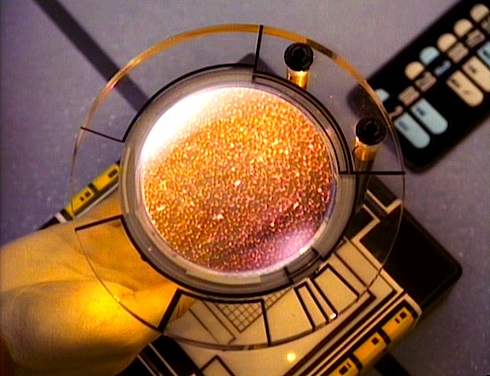
It’s funny how the show just doesn’t feel like TNG without the high-collar jackets. It took me a long time to realize that that’s what bothers me most about rewatching the first couple of seasons.
Wow, Bob Kelso was on Star Trek? I never knew.
This is actually first iteration of the new uniforms. They kept playing around with them for a couple of episodes until they came up with the jackets with the waistband. In fact I believe the womens uniforms stayed the same except for the addtion of the collar.
I think the complete off-air handling of Worf and Geordi’s promotions and Crusher’s return was something that was missed by the shows writers and producers. We somehow are supposed to take it for granted the Geordi, who we last saw piloting the ship is now Chief Engineer and that there aren’t any problems with this. Not a single pissed-off subordinate who wanted the job? Not a single moment of self-doubt? Worf becoming a lieutenant isn’t as much of a leap since he’s in essence doing the same job, and Crusher at least gets her son pissed off at her, but still this could have been worth at least a few shows worth of mentions.
I know, I know- TNG doesn’t have a multi-episode story arc to it, unlike all the other series that came after it, but it’s still something that should have at least been part of some B-scene… Riker joking to LaForge that they give him the engine room and the ship breaks immediately or something.
BTW- is it just me or should there not be more Lt. Commanders and Commanders running around? I know there is a senior staff, but presumably they work only 8 hours on shift in a normal day… shouldn’t there at least be some more mid-level officers to be in charge during the night shifts?
Mklem44: Uh, La Forge has been chief engineer for a year now. He was made CE at the top of the second season. “Evolution” just saw him jump a grade in rank after only a year as a full lieutenant, which was a little wonky, and I suspect a sop to LeVar Burton’s name recognition.
—Keith R.A. DeCandido
Don’t forget, the new uniforms will force the birth of “The Picard Maneuver”!
I remember seeing an interview with Michael Piller where he said that the writing staff had absolutely no scripts in development going into the third season, and had to do everything on the fly. You can tell — the first few episodes are at the same low level of quality as the second season, and it’s only once they hit “Who Watches the Watchers?” that this year really takes off. But once it does, WOW!
@Dholton (#6): My guess is that an entirely different kind of Picard Maneuver was necessary with the spandex uniforms, but that Patrick Stewart and the rest of the cast performed it when the cameras weren’t rolling.
BTW, one bit of “evolution” worth noting (or not) was had by the title sequence background. Gone was the trip through our solar system (which I happened to like), and here was the title sequence the series employed for the rest of its run.
One thing I love about this episode is how solid the science is. The phenomenon Stubbs is studying is a pretty darn authentic portrayal of a real astrophysical process, none of the wacky technobabble the later shows tended to throw at us. This is something that really happens to binary stars, the mechanism behind novas and Type I supernovas, and it was depicted without any major inaccuracies (allowing for some degree of poetic license/technological limitations from the FX department).
Also, it was the first mention of nanotechnology in the Trek universe, one of its first mentions in any SFTV or film production, and as far as I know it’s the story that created the word “nanite,” a term that’s subsequently caught on more broadly as a synonym for “nanobot.” Although the portrayal of the ease with which the nanites developed sentience was kind of awkward, as was the portrayal of nanotech as something with only limited uses rather than something integrated throughout future technology.
And of course it’s the debut of Michael Piller, arguably the best writer modern Trek ever had, the Gene L. Coon of TNG. I love Stubbs’s monologue about playing baseball games in his mind. Sheer poetry.
Nice work as always.
But you might want to fix the typo “unusbtly”
For the longest time I had thought Who Watches the Watchers was the first episode of this season… Damn.
@11: Actually “The Ensigns of Command” was the first episode produced for the third season, but “Evolution” was meant to be aired first. I believe “Ensigns” was often aired first in syndicated reruns. “Who Watches the Watchers” is fourth in both production and airdate order.
@@@@@ #9 CLB: “And of course it’s the debut of Michael Piller, arguably the best writer modern Trek ever had, the Gene L. Coon of TNG.”
Piller was great, but let us also not forget Ronald Moore, who (if memory serves) had his debut with “The Bonding” and went on to be another of Trek’s best writers.
Not the best of episodes, but still a good, solid season opener – certainly deserving of more than a 5 IMHO, as it beats the pants off most of seasons 1 and 2. In ‘Evolution’ we see a coherent plot, a cast finally at ease with themselves and the roles they play (which is a relief after certain season 1 episodes that shall remain nameless!), and some excellent directing. Can’t ask for much more.
It’s always fun to see some of the things you miss when you originally watched these episodes when you were 8 years old. Until I saw a rerun of it last year, I had no idea that Bob Kelso had guest starred on Trek. ;-)
And yet, I definitely can tell that these are the first iteration of the Mandarin Collared 2 piece uniforms. If you look closely you’ll see that the chest/stomach area of the department color is paneled as opposed to one solid piece of fabric. And Stewart had done the “Picard Maneuver” prior to these uniforms in the earlier seasons, but instead of it looking regal and authority driven, with the Spandex one-piece it just looks like he’s struggling inside an uncomfortable wetsuit. Thank goodness for Spiner & Stewart’s chiropractors: I’d hate to think what the future costuming would look like had they not brought in doctor’s notes demanding that Blackman do something about the horrendous unitards.
I always found that these new forms of sentient life that the Enterprise discovered (similarly to the Exocomps in a later episode) were always interesting, but not really holding with the worldview of Trek. I mean, for example: Data is said to be so unique that in “Measure of a Man”, Maddox wants to take him back to the Daystrom Institute for dissection. But there have been copious amounts of androids running around the cosmos in the past: Ruk, the Alice class units from Mudd’s Planet, Rayna Kapec, etc. And no one tries to dig up or dissect any of them for implementation. So why after these unique forms of sentient life are they never revisited or reverse engineered by Starfleet or anyone else (seemingly)? I know it’s just episodic television, but these things could have been used in any number of Deus Ex Machina situations regarding tech, or heck, even Data, and still have it be perfectly legit and in universe. Just an opinion, though.
I do agree that it is an interesting, albeit forgettable, episode.
Welcome high-collared uniforms!
Good review as usual, krad. This episode has one of my favorite lines from Picard to Riker: “Number One, the bridge, such as it is…is yours.” Classic.
One question, though (trying not to get too technical): wouldn’t the inertial dampeners prevent the shaking the ship experiences that causes Stubbs to collapse?
I always enjoyed how Guinan talked about Frankenstein as a real man she actually once knew in this episode. At least, she seemed to. Hey, it’s like how C.S. Lewis mentioned that the events of The Magician’s Nephew took place back when Sherlock Holmes was still active at Baker Street. I like the notion that fictional characters share the same universe.
And really, the events of Frankenstein are almost tame compared to some of the things the Trekverse asks us to accept.
As a baseball fan I’ve always had a fondness for this episode, particularly the Shuttle Bay scene….
“A brand new era in astrophysics, postponed 196 years, on account of rain.” hmmmm
The visual effects were beautiful and the story was alright, though the resolution a bit rushed.
And I couldn’t help thinking that these nanites would later evolve into the SG1 replicators! :P
@17: Considering “Time’s Arrow” she may very well have known him! ;)
I am a big fan of Bob Kelso, but I am definitely not in Stubbs’ corner. So until Scrubs cam out, I did not really like this episode. Wes breaking the ship was amusing, I always thought Guinan was just being metaphorical, especially since she probably knows Wes has no idea what she means, and Data is heroic as always.
I am thrilled for the beginning of season 3, but unfortunately, I think the warp rating for this episode was pretty accurate. I actually like the next three episodes a lot, so this episode is the least watched on the DVD.
According to TNG”s scientific consultant at the time, Dave Krieger, the original script of this episode had dust mites evlove a culture, not nanites! Krieger introduced nanothecnology into Star Trek to overcome a silly script and the rest is history:
http://www.davekrieger.net/Waves/
This was the first episode of TNG I ever watched, and I still enjoy it. I think it rates more than a 5, easily–a 7, even 8?–for its solid characterization and plotting and setting. “Evolution” does what it does quite well.
@Mkelm44: the night shift shows up in one or two episodes, with Data taking command. Luckily, nothing interesting ever happens while they’re on duty. Imagine that. You can handwave away some of it by assuming the primary staff schedules their waking hours for events like planetfall and are conditioned to get to the bridge immediately for unforseen encounters. There’s probably an official explanation already out there.
After a year or two of the collared uniforms, the old ones were almost unwatchable. Crisp replaced tight and tacky. Although the new uniforms look even more like pajamas to me than the old.
I guess I’m a rare Pulaski fan. I can see why people disliked her. And somehow I missed all the McCoy parallels the first time around. But her cool, slightly impatient, matter-of-fact attitude is shared by the vast majority of doctors I’ve encountered in real life, including my favorites. Crusher always seemed too soft and nebulous for many of the roles she played in Starfleet.
Sorry to say I’ve almost completely forgotten this episode. I suppose it didn’t stand out as a bad one.
@Mkelm44: As for rank distributions, this never stuck out more than when Picard found a love interest in a high-ranking officer he and we had never met before. Wiki says she was lieutenant commander, which isn’t as incongruous as my memory of full commander. Maybe I’m confusing it with the time a chameleon infiltrated the bridge crew. Still, with so few higher ranks visible on the ship, you’d expect the captain to have a better handle on who’s serving directly beneath him.
I never paid much attention to rank, though. Maybe there were more high-ranking officers in temporary appearances than I realized.
@Christopher (#9) & don3comp (#13): Ron Moore is indeed an excellent writer, but I think Michael Piller got Star Trek more than any other writer in the modern series. Gene Roddenberry was a conceptual guy — he had great Big Ideas, but he didn’t know how to make ideas with them. Michael Piller knew how to make really good stories that stayed within Roddenberry’s big ideas. Christopher’s comparison to Gene Coon is a very good one. Both Coon and Piller were good writers who could pick ups what Roddenberry was throwing down (as the kids say).
Ron Moore, on the other hand, is a great writer but he always chaffed against Roddenberry’s ideas. He did his best work with Klingons, or on Deep Space Nine, which ignored a lot of the constraints that Roddenberry put on Star Trek to keep the episodes on-message. Moore’s best work was on Battlestar Galactica, when he didn’t need to make any compromises to allow for Star Trek’s more optimistic tone. Although Moore did very good work on Star Trek, I think his style wasn’t very compatable with the show. The dark turns in DS9 and Star Trek: First Contact are exciting, but they don’t always sit well with me.
There’s a great story about a conflict between Piller and Moore over the ending of “The First Duty,” which Moore wrote. Moore was adamant that Wesley would not betray his flight team and would continue to lie to protect them even when Picard had guessed the truth, whereas Piller felt that that ending was good, dramatic storytelling but that it was just wrong for Star Trek. Moore always felt that Piller was wrong to overrule him, but I don’t think there’s any doubt Roddenberry would have agreed with Piller. And Piller was right — Moore’s ending would have worked great on Battlestar Galactica, maybe even on DS9, but it was wrong for Star Trek: TNG.
@17 John
So if Guinan knew Frankenstein, and Spock’s ancestor was Sherlock Holmes, what other fictional universes does Star Trek exist in? Can we please pretend Frankenstein and Holmes are non-fiction stories in the Star Trek world? :-) (I know all the Data stuff wouldn’t work, but whatever)
Sentient Nanites vs. Borg Nanoprobes –
Who would win?
This is an overall good episode, with nice cast re-introductions, an interesting story, decent guest star and the switch over to the better uniforms.
Before I get to my problem with this episode, let me start by saying that Ron Jones was the best of TNG’s music composers. His episodes are instantly recognizable with unforgetable musical atmosphere. Having said that, he really “strikes out” on this one. Not that the music is bad, but more out-of-place. When the Enterprise is being pulled into the stellar matter, the weird pulsing synthesizer score is odd to say the least…
@7, “You can tell — the first few episodes are at the same low level of quality as the second season,”
Wow, first of all, the 3rd episode is “The Survivors”, which is universally considered one of the best episodes of the series, (I consider it the best, bar none).
And second, what is with the season 2 hate? I think universally people consider 3-5 the best seasons, however, I think season 5 is muh weaker than is commonly thought, and season 2 is WAY stronger than it gets credit for. I honestly think the season 2 hate is due to the older uniforms remind people of season 1, and Pulaski, who has her lovers and her haters (I am one of her fans). But seriously, I do think season 2 is very slightly weaker than season 3, but I think 2 is much, much closer to 3 in quality than it is to season 1. And I personally think season to is the 2nd best season behind 3. You can make an argument for season 4, but it is light-years ahead of seasons 5-7.
@8, I agree, I think instead of the trip through the galaxy they should have extended, or smoothed out the trip through the solar system….
Does anyone know why they replaced the solar system main credits sequence?
As for this episode, nice, but forgettable, and maybe I am the only one here, but I kind of prefer the old uniforms. I feel like the actors got too comfortable in these pajamas.
@24, I never heard that about a disagreement between Piller and Moore, but I completely agree with you, Piller made the right decision. I love the new BSG, but I don’t like when drama is created for the sake of drama, not the story. And if there were any faults with Moores BSG, I think he often went for what was better dramatically than what made the most sense for the characters or the story. But again, I LOVE show.
@27, regarding Ron Jones, I completely agree with you, but with this episode I have the soundtrack, and I LOVE the soundtrack, but I really should watch the episode to see if I agree with you on the placement of the music in the episode.
Lt. Cmdr. Data: Dr. Stubbs, your own actions have provided evidence to the contrary. When you destroyed the nanites in the core, they responded by interfering with our life support systems. It is difficult to accept these as random actions by machines with loose screws.

Dr. Paul Stubbs: Data, what has two thumbs and doesn’t give a crap?
Paul Stubbs. How ya doin’?
@30 is correct, the character”s name is Paul Stubbs, not Kevin Stubbs.
I disagree with Ken Jenkins not nailing the part. I thought he was terrific and makes a mediocre episode just a little bit better than it might have been.
Another very belated reply… I don’t get updates for threads I posted in before I registered, and I only occasionally remember to check “All Conversations.”
@15/JYHASH: ” Data is said to be so unique that in “Measure of a Man”, Maddox wants to take him back to the Daystrom Institute for dissection. But there have been copious amounts of androids running around the cosmos in the past: Ruk, the Alice class units from Mudd’s Planet, Rayna Kapec, etc. And no one tries to dig up or dissect any of them for implementation. So why after these unique forms of sentient life are they never revisited or reverse engineered by Starfleet or anyone else (seemingly)?”
What’s unique about Data is his positronic brain, not his body. The Mudd androids didn’t seem to be sentient; they were just drones controlled by a single central computer that was pretty limited and easy to fool. Most TOS androids were pretty rigidly programmed and inflexible, fitting 1960s expectations about computers. Rayna was the only one that seemed to be truly sentient (and I’ve always suspected she was positronic, given that she “died” in pretty much the exact same way Lal did, overloaded by an emotional conflict). And given how secretive Flint was, and how much he cared for Rayna, I doubt he would’ve left her remains lying around where they could be found and pawed through by future cybernetics researchers.
i am currently doing a netflix rewatch during covid stay home time…
a few comments
1. so wesley is so good he can create life by accident as part of a school project
2. do you think the nanites will worship him as a god?
3. seems they could have eventually been used as defense against borg nanites. could they become members of the federation
As Michael Piller has a writing credit for this episode, Dr. Stubbs love of baseball served as a kind of prototype for Sisko it seems. I love the metaphor in this episode and I thought it was a brilliant line when Stubbs quips that a brand new era in astrophysics might be postponed 196 years on account of rain.
The nanite plot is interesting, but kind of lame in one sense. I find it hard to believe that no one before Wesley ever let two nanites interact before?! I do like the peaceful outcome of the episode, although the nanites seemed awfully quick to forgive the mass murdering of a bunch of them. At that point, the episode was really stretched for time, so I guess it was necessary. Certainly the pacing could have been better.
One thing does confuse me, though. When Troi visits Stubbs later in the episode, the following dialogue occurs:
TROI: Your self portrait is so practiced, so polished.
STUBBS: Yes, isn’t it, though?
TROI: It is stretched so tight the tension fills this room. And if you finally fail, I fear it will snap.
STUBBS: A good try, Counsellor. But sometimes when you reach beneath a man’s self portrait, as you so eloquently put it, deep down inside what you find is nothing at all.
I really have no clue what Stubbs’s point is. Can someone enlighten me?
@37/Thierafhal: Hmm. I’d always assumed that Wes had modified the nanites in some way, but you’re right, the dialogue just says he let two interact. Still, I have to assume that he was oversimplifying, that it involved two specific complementary types of nanite allowed to interact in a certain way that let them modify each other.
“I really have no clue what Stubbs’s point is. Can someone enlighten me?”
Sounds like impostor syndrome to me. He doubts he really has anything of worth beneath the facade he’s constructed. Or maybe he means that he has nothing in his life but his work and feels empty. Or maybe he’s just being evasive toward her attempts to analyze him.
“So if Guinan knew Frankenstein, and Spock’s ancestor was Sherlock Holmes”
I always figured it meant one of Spock’s ancestors was Arthur Conan Doyle.
“Does anyone know why they replaced the solar system main credits sequence?”
If you look carefully, it had some problems. For example, the moon suddenly speeds up dramatically and changes direction right before the screen scrolls past it.
And I also think the CGI planets look a bit hokey compared to what the series was later capable of.
@39/Daniel B: “And I also think the CGI planets look a bit hokey compared to what the series was later capable of.”
Those weren’t CGI. I just double-checked with Mike Okuda, and he confirmed that they were physical models shot by ILM. The only involvement of computers in the process would’ve been the motion-control programming of the cameras. As far as I can tell, the only significant uses of CGI in TNG were for the Crystalline Entity in “Datalore” and “Silicon Avatar” and for the space creatures in “Galaxy’s Child” (though there was a physical model for those too).
Indeed, I doubt that infamous “moon going the wrong way” tracking error would’ve occurred if it had been CGI, because the computer would’ve been able to keep track of the relative positions of the bodies in 3 dimensions. It was the result of trying to plot out the movements of independently photographed elements and blend them together optically in 2D; there was a miscalculation somewhere along the way.
35: Nanites vs Borg nanoprobes – another example of how the Borg (and later the Dominion) are a dark reflection of the Federation and everything it stands for.
A better analogy than the game called on account of rain would be the World Series game interrupted by an earthquake, but that took place a few weeks after this episode first aired.
Beverly is good in this one, but her return reminds me of how insufferably annoying she will becone.
I miss Pulaski.
@43/fullyfunctional:
In what way is she insufferably annoying? I found her to be alright, matter of personal preference I guess. I mean I’m not a Wesley hater either so I guess it takes a lot to make a chatacter annoying to me
@43,44: I personally never found Beverly annoying. She always came across as a professional and competent person, brilliant as well, with interests (and talent) in dancing and theater which I can also relate to. If anything, I thought Pulaski was the annoying one. But she was also good for the character conflict she created by being aboard. Still, I prefer Beverly and was glad she came back.
@45. Don’t get me wrong, there are plenty of episodes and individual moments where I don’t mind Beverly Crusher. I freely admit though, that a single episode turned me off of that character forever, and everything she did after that was colored by her actions in The High Ground, which is coming up soon in my own little personal rewatch here. And I dread it. By far my least favorite Trek episode ever.
I want to like Crusher. Picard does, and I trust his judgment. And I’ll do my best as I work through the seasons again. But I know when I get to Season 3, Episode 12, I’m going to be spitting bile at the screen. Lol
@46: Why’s that? Do you think she was giving comfort to the enemy?
@47 Her reckless insubordination directly causes death, and threatens the Enterprise and its crew. Meanwhile, she moons over a terrorist because he draws pretty hands.
More globally, I find Crusher to be a rather one- dimensional character, except when she’s being insubordinate and taking advantage of Picard’s obvious affection for her. Pulaski was grating, but oh so much more interesting.
@48: Hindsight is 20/20. She had no way of knowing she would be abducted by terrorists. And how did she cause anyone to die? The terrorists would have attached the Enterprise whether they had her captive or not. She didn’t give the terrorists any tactical information about the ship. Also, I don’t think she was mooning over Finn. She just recognized he wasn’t a one-dimensional villain and had some sensitivity to him; the same sensitivity she tried to appeal to in hopes of getting him to stop his attacks, including pleading with him not to blow up the Enterprise.
I’m so happy to see the collared, two-piece uniforms arrive. (Not the most staggeringly insightful comment all these many years later, but if you ask me the transition can’t get enough love.) I hadn’t remembered the initial iteration with those awkwardly pleated/paneled fronts, though.